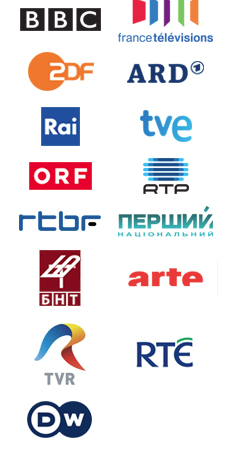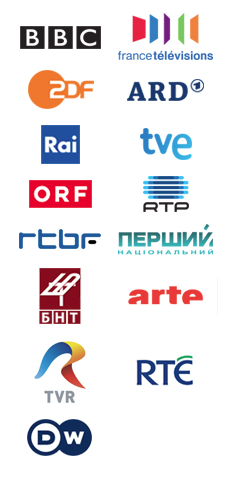The parties have their Commission President candidates. TV channels, it’s over to you: 15th May debate on prime time TV please.

 I write this blog entry as a convinced EU democrat. By that I mean that, faced with the options about how to solve the many problems the EU currently faces, actually trying to make democracy work at EU level is the least worst of the available options. Yes it is going to be hard, yes it is going to be imperfect, yes I wonder whether it will ever work. Yet all the alternatives are worse. The EU already does so much that a return to limited, functionalist technocracy is no solution. An intergovernmental union of 28 would be stuck making decisions at the lowest common denominator. The notion of just a free market is a misnomer, for the rules of any market are essentially political. The EU has achieved some sort of notion of transnational democracy – no other international organisation has anything elected as the European Parliament is.
I write this blog entry as a convinced EU democrat. By that I mean that, faced with the options about how to solve the many problems the EU currently faces, actually trying to make democracy work at EU level is the least worst of the available options. Yes it is going to be hard, yes it is going to be imperfect, yes I wonder whether it will ever work. Yet all the alternatives are worse. The EU already does so much that a return to limited, functionalist technocracy is no solution. An intergovernmental union of 28 would be stuck making decisions at the lowest common denominator. The notion of just a free market is a misnomer, for the rules of any market are essentially political. The EU has achieved some sort of notion of transnational democracy – no other international organisation has anything elected as the European Parliament is.
Within this arduous process to democratise the European Union it is foolish to pretend that things are perfect, to imply there is harmony when there is not, and to try to shield a population from the perceived worst of Brussels.
This then leads me, once more to the issue of the European political parties candidates for President of the European Commission, known in the Brussels jargon as the Spitzenkandidat process, and specifically in this blog entry the debate (or lack of it) around this process.
Yes, the process is imperfect. The parties chose their candidates (Schulz for the PES, Juncker for the EPP, Verhofstadt for the Liberals, Keller and Bové for the Greens, Tsipras for the far left) via a variety of different routes and, apart from the Greens’ open primary, none of the processes were particularly open or transparent. Yet, for the first time ever, all the major political groups have put forward candidates. End up with a centre left majority and get Schulz in the Commission, end up with the centre right and get Juncker. The parties have, more or less, delivered.
Now then it is the turn of the media. If there are candidates for top positions, then the people that are actually going to vote in the European Parliament elections actually need to know what is going on. In most EU countries there is the tradition in national elections of hosting TV debates with the leading candidates for the parties, and the same will happen in the Spitzenkandidat process – I currently know of 7 debates between candidates, of which 2 have already happened. The biggest debate of all is scheduled for 15th May, hosted by the European Broadcasting Union.
While I am of course a strong advocate of online media, and the Europeanisation of debates that can promote, nothing yet has the reach that the major national TV channels in Europe still do. That is the reason why televised debates are important in this process.
ARD and ZDF in Germany, and ORF in Austria are already invested in the process and even are hosting their own debates. RAI is involved in the 9th May debate in Florence.
However in France, France 2 and France 3 are refusing to show the 15th May debate, as Fabien Cazenave outlines. Philip Cordery of the PS has written to France Télévisions about this omission, and if you care about it in France there’s a petition at Change FR about it too.
In the UK the situation appears to be little better. BBC schedules for 15th May are not yet available for BBC1 or BBC2 (nothing beyond 3rd May is currently available). The BBC is listed as a participant in the debate, but it so far remains unknown which BBC channel, if any, will show it. There’s a Change UK petition to demand the BBC shows the debate too. I have also tweeted Gavin Hewitt and Laurence Peter of the BBC’s Brussels team to ask what is happening:
https://twitter.com/jonworth/status/458323120362106880
Laurence Peter was also happy to pen a blog entry today quoting Herman Van Rompuy’s criticisms of the Spitzenkandidat process, and that citizens think they know who really takes the decisions. Did Mr Peter perhaps stop to reflect that if the BBC decides to not screen the 15th May debate on one of its mainstream channels that his broadcaster might actually be playing a role in improving citizens’ knowledge of the process?
Yes, the UK might be partially absent from the Spitzenkandidat process, but the outcome is nevertheless going to be important for the EU and the UK, and is almost sure to give Cameron a headache. I also do not subscribe to the David Rennie view that it would be better for the pro-EU side in the UK for debates to not be screened, as to do so would hasten the UK’s exit. Shielding the UK from the realities of how the EU works, how it is developing is no good – it’s dishonest and disingenuous. If watching two middle aged men debate hastens the UK’s exit, so be it, because it might be a decision taken on the basis of a slightly better grasp of the issues.
In summary then, the issue here is clear: the parties have delivered on their side of the bargain to put forward candidates. It’s now the turn of the media to deliver on its side. The demand is simple: the 15th May debate must be shown on prime time television in all of the EU. If it is not then the criticism that the candidates themselves are at fault for being unknown rings hollow.
[UPDATE 24.4.2014, 1715]
It has been confirmed that only BBC Parliament will show the debate in the UK, and only Phoenix in Germany. There’s a petition to get that changed in Germany here.
Oh, Jon, you are misunderstanding how a European Parliament campaign is supposed to work. First, ignore all EU stuff, it’s not part of the campaign. Also ignore all international stuff; an European Parliament election is just a number of separate national elections. You can’t vote for Labour Party in Denmark, and you can’t vote for Socialdemokratiet in Britain. It’s all about national matters. Also, during the campaign, you should give a lot of room to politicians who are not even European Parliament candidates, such as leaders of domestic parties who are normally ministers or members of national parliaments. European Parliament candidates are secondary, although you see pictures of some of them on election posters around the city. Also, as the European Parliament candidates are secondary, domestic matters (such as questions handled in national parliaments instead of the European Parliament) should be given a lot of room in the campaign, although matters for the European Parliament may be given some footnotes here and there. Also, as the European Parliament is unimportant, campaigns for it should be very small. Better not waste a lot of resources which can better be spent on campaigns for domestic elections.
This is mostly how European Parliament election campaigns are done in Sweden. Are things different in other countries?
If you spend too long on social media you start to believe all the windbags rallying against the EU are the majority . Most people don’t hold strong views on the matters and actually when push comes to shove most people will drift behind the position of opinion formers (who on the whole in the UK are moderate euroskeptics and not outright withdrawal-ists)
On the whole I think showing the debates would be a good thing. Counter-intuitively I suspect that showing EU politics as boring and technocratic might be rather helpful. It undermines the perception from the more radical anti-EU elements that there is a secret agenda (against Britain etc). Given most EU-phobes want to keep the trade element (which would require a technocratic bureaucracy anyway) their argument is indirectly undermined.
Ultimately since leaving social media I have become more confident of the UK’s role (and future role) in the EU. I think increasingly UKIP are exposing themselves as ugly populists (with unpleasant xenophobic and bigoted tendencies) that they are. Their odd mix of libertarian and protectionist positions are being exposed for the brain dead nonsense it is and actually this is helping to undermine the bigots in other parties. Once the bigots have been marginalised I think everybody will start to see the EU as the boring bureaucracy that it is and will start to elect more sensible representatives who will be better equipped to navigate it.